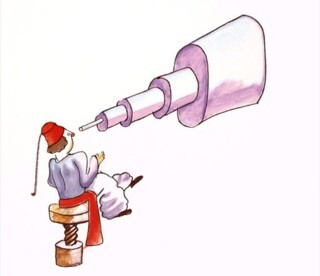Turkish versions of ‘The Little Prince’
Kaya Genç
The copyright in The Little Prince expired in most of the world at the end of last year (it has thirty more years to run in France because Antoine de Saint-Exupéry died in the Second World War, 'Mort pour la France'). In the first two weeks of January, more than thirty Turkish publishers released translations of the1943 novella. Between them they bought 130,000 bandrols, holographic stickers required for every book sold in Turkey.
In a newspaper books supplement the other week, almost half the adverts were for The Little Prince. One publisher put out a mandarine-flavoured edition. Another released three differentversions, to show the differences in translation trends. There is a 3D pop-up edition. The publishing house that used to own the Turkish copyright sold the book at around £5. Leftist publishers arereleasing cheap editions for £1. The first Turkish translation of The Little Prince was serialised in Çocuk ve Yuva ('Child and Home') magazine in 1953. The magazine was owned bya foundation set up to help the orphaned children of First World War soldiers. The translation was by Ahmet Muhip Dıranas, a poet who also translated Baudelaire.
In the fourth chapter, recounting his life to the pilot-narrator of the book, the prince describes how his house-sized asteroid B-612 was discovered by a Turkish astronomer:
I have serious reason to believe that the planet from which the little prince came is the asteroid known as B-612.
This asteroid has only once been seen through the telescope. That was by a Turkish astronomer, in 1909.
On making his discovery, the astronomer had presented it to the International Astronomical Congress, in a great demonstration. But he was in Turkish costume, and so nobody would believe what hesaid.
Grown-ups are like that...
Fortunately, however, for the reputation of Asteroid B-612, a Turkish dictator made a law that his subjects, under pain of death, should change to European costume. So in 1920 the astronomer gavehis demonstration all over again, dressed with impressive style and elegance. And this time everybody accepted his report.
Turkish citizens were prohibited from wearing the Fez and other traditional garments in 1925. Dıranas, whose edition was republished this month, translated the sentence about the Hat Law intoTurkish like this: 'Fortunately, Turks had started dressing like Europeans afterwards, with help from a great leader.' When Tomris Uyar and Cemal Süreya translated the book in 1995, they renderedit slightly differently: 'A peremptory Turkish leader had issued a law one day: from now on all would be dressed as Europeans, and others sentenced to death.'
The translators' reluctance to render the passage accurately was understandable, given the severity of the law that punishes insulting Atatürk with up to three years in prison. The new translationsof The Little Prince are less circumspect. No complaints have yet been filed.

Comments